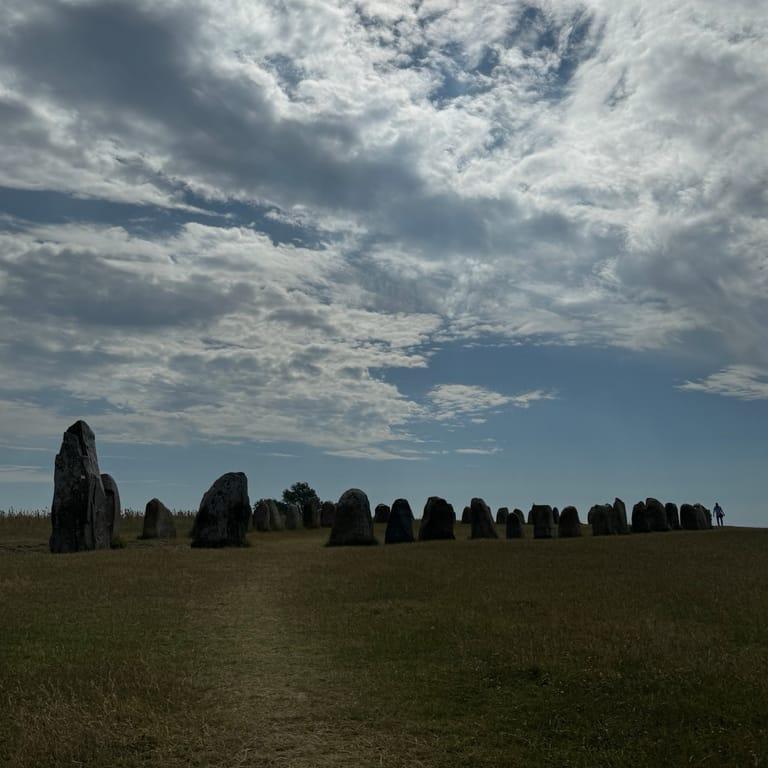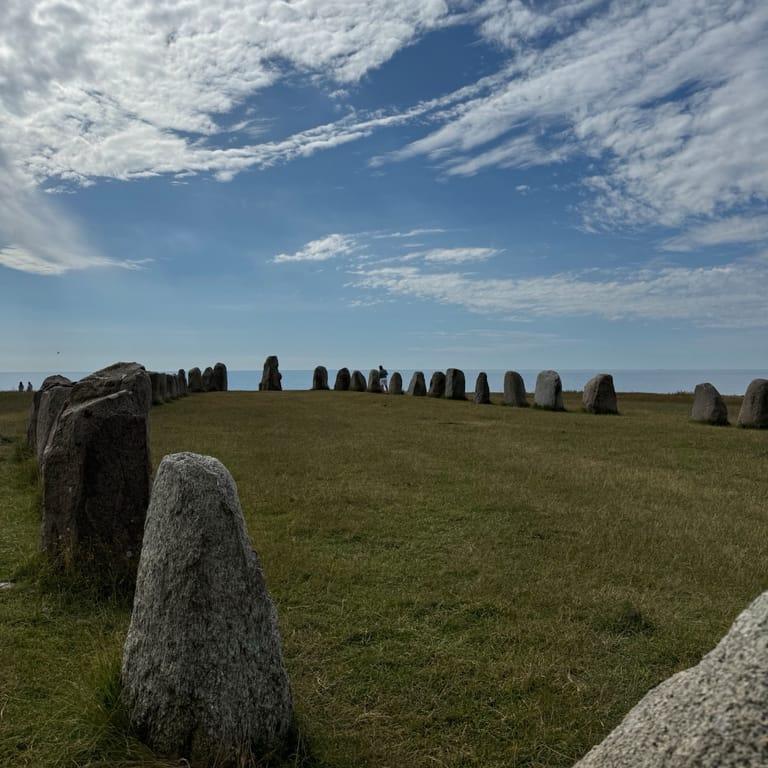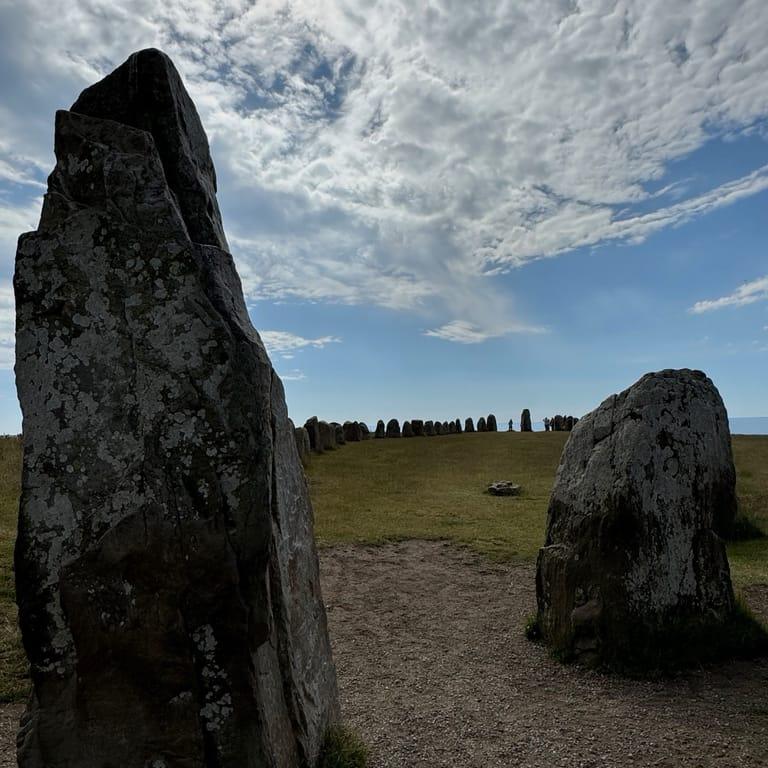Nestled on a grassy knoll overlooking the shimmering Baltic Sea near Kåseberga, Sweden, Ales Stenar is a breathtaking ancient megalithic monument dating back to the Nordic Bronze Age (1400–1000 BC). This enigmatic site consists of 59 massive stones arranged in the shape of a ship, perched majestically on a hill that offers panoramic views over the coast. Whether you're a history buff, a nature lover, or an adventurous traveler, Ales Stenar provides a unique window into Sweden’s mystical past.
The monument’s origin story sparks lively debate among archaeologists. Some believe it was a sophisticated calendar that tracked equinoxes using the sun’s position, while others suggest it served as a sacred cult site or an ancient tomb. Intriguingly, "cup marks" — small, rounded indentations typical of Stone Age graves — are found on parts of the boulders, hinting that stones from older graves were repurposed here. This rich layering of history invites visitors to explore and ponder the mysteries embedded in every stone.
After soaking in the stunning views from the hilltop, visitors can wander down to the charming harbor of Kåseberga. Here, local restaurants and cozy cafés offer fresh seafood and Swedish delicacies at reasonable prices. During summer, the pastures nearby are dotted with peacefully grazing cows, creating a serene and pastoral atmosphere that perfectly complements the historical visit. Watch paragliders soaring overhead or treat yourself to a classic waffle or ice cream — a perfect way to round off your trip.
- Breathtaking coastal views from the stone ship hilltop.
- Rich archaeological significance with ancient cup marks on the stones.
- Free entrance with nearby paid parking options.
- Family-friendly environment with activities for children and scenic walks.
- What is Ales Stenar? Ales Stenar is an ancient megalithic monument shaped like a ship made of 59 large stones, dating back to the Nordic Bronze Age and located near Kåseberga, Sweden.
- How do I get to Ales Stenar? You can reach Ales Stenar by car, bus, or bicycle. The nearest town is Ystad, from where buses and bike tours are available to Kåseberga, followed by a short walk to the site.
- Is there an entrance fee? Visiting Ales Stenar is free of charge, though parking nearby may require a small fee.
- Are there facilities nearby? Yes, the nearby harbor offers restaurants, cafés, and shops where visitors can enjoy local cuisine and buy souvenirs.
- Is the site wheelchair accessible? The uphill walk to the stone ship may be difficult for visitors with mobility challenges and the path is not fully wheelchair accessible.
Visitors consistently praise Ales Stenar for its dramatic coastal scenery, profound historical aura, and peaceful ambiance. The site offers an immersive experience that blends nature, archaeology, and cultural wonder, making it a must-see destination in southern Sweden. Whether you're exploring with family or seeking a reflective retreat, Ales Stenar promises unforgettable moments etched into the landscape and your memory.
Nestled on a sun-drenched hilltop overlooking the shimmering Baltic Sea, Ales Stenar is an extraordinary prehistoric monument that captivates visitors with its mysterious, ancient allure. Known affectionately as Sweden's Stonehenge, this impressive structure consists of 59 towering stones arranged meticulously in the shape of a ship—a design that has fascinated historians, archaeologists, and travelers alike.
Dating back to between 1400 and 1000 BC, during the Nordic Bronze Age, Ales Stenar was constructed with remarkable precision and purpose. The stones were carefully chosen and placed to form an oval outline resembling a large stone ship, a motif deeply woven into Nordic cultural symbolism. Archaeological evidence reveals that some of the boulders bear cup marks—small carved, rounded depressions commonly found on Stone Age burial sites like dolmens and passage tombs. This intriguing detail suggests that stones from ancient graves were repurposed to build the monument, adding layers of historical and spiritual significance.
While the exact purpose of Ales Stenar remains a subject of scholarly debate, several compelling theories have emerged. Some experts propose that it served as a burial site or a cult place, honoring the deceased or spiritual beliefs of the ancient Nordic peoples. Others suggest it might have functioned as an astronomical observatory or calendar, as its orientation could mark equinoxes and solstices by tracking the sun's movements. This multifaceted mystery adds to the monument’s allure, inviting visitors to ponder the lives and knowledge of those who built it thousands of years ago.
Today, Ales Stenar continues to enchant travelers from around the world, standing proudly atop a hill in Kåseberga, near the village of Löderup in Skåne län, Sweden. Visitors can enjoy breathtaking panoramic views of the North Sea coast while exploring the 1400-year-old monument. The site is accessible with a short uphill walk from the parking area, and its open surroundings make it ideal for families, including children who might delight in spotting grazing cows or paragliders soaring overhead. Nearby, cozy cafés and local restaurants offer a perfect spot to savor traditional Swedish fare, rounding out a memorable day steeped in history and natural beauty.
- 1400 BC: Construction of Ales Stenar begins during the Nordic Bronze Age.
- 1000 BC: Completion of the monument, marking an enduring legacy of Nordic craftsmanship.
- Present day: Ales Stenar remains a beloved tourist site, drawing history buffs and nature lovers worldwide.
Nestled atop a gentle hill in Löderup, Sweden, Ales Stenar stands as a remarkable 1400-year-old megalithic monument shaped like a ship, composed of 59 massive stones. This historic site offers visitors a blend of breathtaking coastal views and a fascinating glimpse into ancient Nordic culture.
Visitors are captivated by the monument's impressive size and unique ship-like shape, believed to have served as a calendar, tomb, or ceremonial site. The location offers sweeping views over the North Sea and the picturesque Swedish coastline, making it a perfect spot for photographers and nature lovers alike.
- Breathtaking views of the ocean and surrounding landscapes enhance the visitor experience.
- Rich historical significance rooted in ancient Nordic traditions with intriguing archaeological features like cup marks.
- Free entry makes it accessible for travelers on any budget seeking authentic Swedish heritage.
- Scenic surroundings including nearby pastures and the charming village of Kåseberga enrich the overall visit.
- Educational experience for history enthusiasts eager to explore Stone Age and Nordic cultural relics.
While Ales Stenar offers an unforgettable experience, visitors should be prepared for a moderately uphill walk of about 600 meters from the parking area to the stones. This ascent may pose challenges for those with mobility issues, as the site is unfortunately not wheelchair accessible and has limited facilities nearby.
Travelers are encouraged to wear comfortable walking shoes and bring essentials like water, especially during warmer months. Despite these minor drawbacks, many visitors praise the serene environment and the opportunity to witness Sweden's enigmatic past up close.
- Park in the village or harbor for convenient access and explore local cafés for refreshments after your visit.
- Watch your children carefully near cliff edges and enjoy spotting cows grazing in the pastures nearby.
- Visit during clear weather to fully appreciate the panoramic ocean views and keep an eye out for paragliders soaring overhead.







